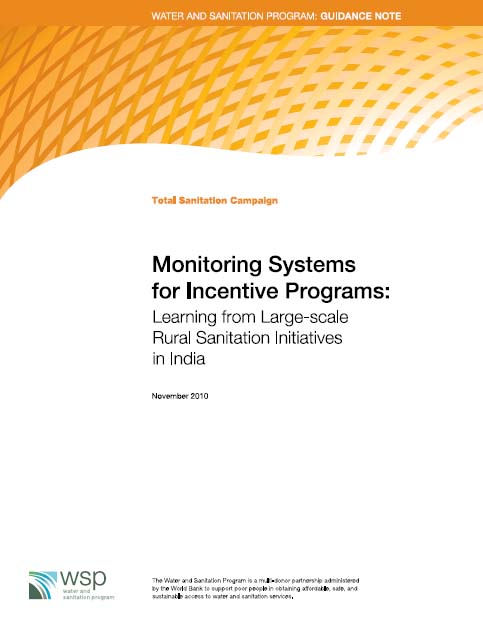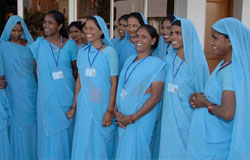Toilets and Urinals
Ashwas process handbook - A planning and execution guide for participatory surveys of household water and sanitation
Posted on 25 Jun, 2011 04:31 PMThe handbook was created as a result of several organisations expressing their interest in conducting an exercise similar to ASHWAS. The purpose of this handbook is thus to serve as a template for those wishing to carry out a similar effort in the other parts of the country.
Assessment study of impact and sustainability of Nirmal Gram Puraskar – A report by CMS Environment
Posted on 24 Jun, 2011 11:02 PMNGP was initiated in Oct 2003 to encourage Panchayati Raj Institutions (PRIs), block and districts to take up sanitation promotion, a post achievement, award-cum-fiscal incentive scheme. The eligibility criteria for the PRIs to receive NGP include: Gram Panchayats, Blocks and Districts, which achieve 100 per cent sanitation coverage in terms of: (1) 100 per cent sanitation coverage of individual households (2) 100 per cent school and anganwadis sanitation coverage (3) Free from open defecation and (4) Clean environment maintenance (liquid and solid waste management).
Scaling up rural sanitation: Findings from the impact evaluation baseline survey in Madhya Pradesh
Posted on 24 Jun, 2011 03:43 PMThis report is a part of a series of papers that analysed the baseline data from all countries where the program was implemented.
From dreams to reality - Compendium of best practices in rural sanitation in India - A document by the Water and Sanitation Programme and the Ministry of Rural Development
Posted on 19 Jun, 2011 05:50 PMThis compendium by the Water and Sanitation Programme and the Ministry of Rural Development, Government of India presents case studies about the achievements and experiences of different situations, institutional models, community mobilisation approaches, supply chain management techniques, capacity building methods, convergence of various programmes, school sanitation, innovative approaches etc from different states and regions in the country.
After a decade of launching the Total Sanitation Campaign, India has seen significant successes in terms of the sanitation coverage, creating open defecation communities/GPs and solid and liquid waste management. Thousands of success stories have emerged across the country while still there are many challenges in making the entire rural India Nirmal and sustaining the changes achieved.
Monitoring systems for incentive programmes - Learning from large scale rural sanitation initiatives in India
Posted on 14 Jun, 2011 03:45 PMMonitoring system for incentive programs – Learning from large-scale rural sanitation initiatives in India – A report by the Water and Sanitation Programme
Posted on 21 May, 2011 02:15 PM It is a part of the Global Scaling Up Rural Sanitation project of the Water and Sanitation Programme, World Bank and focuses on learning how to combine the approaches of Community Led Total Sanitation (CLTS), behavior change communications, and social marketing of sanitation to generate sanitation demand and strengthen the supply of sanitation products and services at scale, leading to improved health for people in rural areas. This is one in a series of knowledge products designed to showcase project findings, assessments and lessons learned in the project.
It is a part of the Global Scaling Up Rural Sanitation project of the Water and Sanitation Programme, World Bank and focuses on learning how to combine the approaches of Community Led Total Sanitation (CLTS), behavior change communications, and social marketing of sanitation to generate sanitation demand and strengthen the supply of sanitation products and services at scale, leading to improved health for people in rural areas. This is one in a series of knowledge products designed to showcase project findings, assessments and lessons learned in the project.
Over the last few years, the concept of open-defecation free communities has emerged as one of the building blocks toward achieving total sanitation. The term ‘access’ is widely used to capture increase in sanitation usage. However, a clean environment is a public good. Hence, there was a need to achieve total sanitation at the community level to realize public health benefits. This has led policy makers and practitioners to adopt strategies that achieve community-wide total sanitation status, which includes the community becoming open-defecation free, and adopting safe hygiene and environmental sanitation practices.
Sekhar Raghavan speaks about saving our water
Posted on 16 May, 2011 06:51 PMContent Courtesy: Rotary Madras South
Talk by Sekhar Raghavan, Rain Centre, at the Rotary Club of Madras South weekly meeting on 26 April 2011 on rainwater harvesting and ecological sanitation - Part 1.
Delight, India's first electronic public toilet in Thiruvanthapuram, Kerala
Posted on 11 May, 2011 12:34 PMWarm Greetings from Eram Scientific Solutions!!!
, is the part of USD $1 Billion, Eram Group. Eram Scientific is based out of Thiruvananthapuram, Kerala and working for addressing the pressing needs of the society through the effective use of Technology. We are giving much emphasis to R&D and now developing solutions to prevent Food Adulteration, Ensuring Women Safety, and Using Non Conventional Energy.
Delight is the blend of Information Communication and Engineering Technologies.
Gender-sensitive sustainable sanitation - Women s groups in Chhattisgarh take initiative to bring toilets into their households and sustainable sanitation into their communities - ADB case study
Posted on 09 May, 2011 03:06 PM

Sanitation in Women’s Hands
Women in the villages of Chhattisgarh, India have banded together to bring some decent sanitation facilities in their homes—something which has been missing in their lives for a very long time.
Role of civil society in sanitation improvement - A case-study from the work of Parivartan in Uttar Pradesh (2010)
Posted on 11 Apr, 2011 12:33 AMThis presentation prepared by the founders of Parivartan, a Kanpur based NGO, deals with the organisation's efforts to improve the sanitation system of the town by involving local citizenry.
Captain SC Tripathi, the founder of Parivartan explains that his organisation is based on a 'collective' model where in all aspects from ideation to implementation is a collective effort. This model seemed appropriate considering the different problems that Kanpur was facing ranging from sanitation issues to drainage, power outages etc. Added to this was political and official apathy, indifference and cynicism of citizenry.





